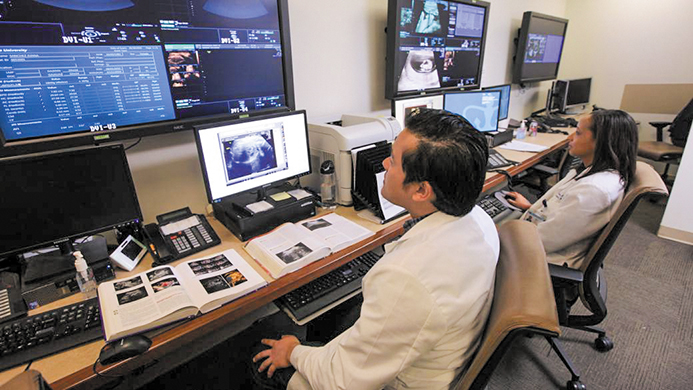Center Excels in Treatment of Rare Twin Syndrome

Dr. Russell S. Miller
About 70 percent of developing identical twins share a placenta. Some 10 percent of these monochorionic twins go on to develop a rare and serious complication called twin-twin transfusion syndrome (TTTS), in which placental blood supply is shared unevenly, with one twin losing blood to the other. TTTS raises the risk of premature birth, serious illness for one or both twins, and possible loss of one or both twins. Left untreated, the risk of losing at least one twin with severe TTTS ranges from 70 to 90 percent.
The maternal-fetal medicine physicians in the Carmen and John Thain Center for Prenatal Pediatrics at NewYork-Presbyterian/Columbia University Irving Medical Center treat the highest volume of TTTS cases in New York City, and are one of a select group of centers in the country offering fetoscopic laser treatment for this disorder — flipping the statistics to a more favorable 80+ percent survival rate for one or both twins.
Although it can present any time in the second trimester or beyond, TTTS is typically diagnosed during weeks 18 to 22 of gestation. If ultrasound surveillance shows excess fluid (polyhydramnios) for one twin (the “recipient”) and decreased fluid (oligohydramnios) for the other (the “donor”), then a diagnosis of TTTS is confirmed and the health of the twins is further evaluated.
“Patients with monochorionic twins should undergo ultrasound screening beginning at about 16 weeks and continuing on an every-other-week basis,” explains Russell S. Miller, MD, maternal-fetal medicine specialist and Medical Director of the Center for Prenatal Pediatrics at NewYork-Presbyterian/Columbia.
“Any time there is a difference in fluid between the twins, or really any ultrasound concern, we recommend referring the patient to a center like ours for a full evaluation and to discuss options, including possible treatment when TTTS is present.” The Center’s team also includes Lynn L. Simpson, MD, Division Director of Maternal-Fetal Medicine at NewYork-Presbyterian/Columbia, Chia-Ling Nhan-Chang, MD, maternal-fetal medicine specialist, and clinical coordinator Rosalie Ingrassia, RN, NP.
If prenatal assessment reveals that therapy is indicated, the Maternal-Fetal Medicine team uses fetoscopic laser surgery to treat TTTS. Under epidural anesthesia in an operating room, the doctor inserts a fetoscope (similar to a long, thin laparoscope) into the recipient twin’s fluid sac within the uterus. The placenta can then be directly inspected, and abnormal blood vessels between the twins are visually mapped out. The physician then uses laser energy to coagulate blood within the abnormal vessels, thereby interrupting the transfusion of blood from one twin to the other.
Prior to the advent of fetoscopic laser, amniotic fluid volume reduction (otherwise known as amnioreduction) was the primary therapy for TTTS, but it is a temporary measure that does not cure the condition. Studies have shown that laser surgery is more effective than amnioreduction for improving twin survival and reducing the risk of neurologic disability. Fetoscopic laser treatment typically needs to be performed just once; a small subset of patients may need a repeat treatment in cases of recurrent or reversed transfusion.
In addition to over a decade of clinical experience with fetoscopic laser technology, the maternal-fetal medicine team at Columbia University is conducting ongoing research on TTTS and its treatment. NewYork-Presbyterian/Columbia is also a member of the North American Fetal Therapy Network (NAFTnet), a federally funded voluntary association of medical centers in the United States and Canada with established expertise in fetal surgery and other forms of multidisciplinary care for complex disorders of the fetus.
Pregnancies complicated by TTTS require close surveillance even after therapy and are at increased risk for premature delivery. Immediately after laser treatment, the Center for Prenatal Pediatrics team closely monitors the mother and her twins, with the ultimate goal to return her to the care of her referring obstetrician for the remainder of prenatal care through delivery. Says Dr. Miller, “We are so appreciative of every referral that we receive, and we respect that patients and their Ob/Gyns often have longstanding relationships. Our goal is to treat all patients to the best of our abilities, to interrupt the TTTS process, and to return them to their doctors’ care once things are heading in the right direction.”
Carmen and John Thain Center for Prenatal Pediatrics Celebrates a Decade of Care
The year 2020 will mark the 10th anniversary of the establishment of the Carmen and John Thain Center for Prenatal Pediatrics. The Center, which evolved from a concept of collaborative care initiated at Columbia in 2004, was created to bring together, in a single dedicated location, all of the specialists pregnant women and their families may need after a significant birth defect or genetic condition has been detected.
The Center for Prenatal Pediatrics team is guided by the principle that caring for babies with abnormalities starts before birth and continues into childhood, with neonatal and long-term pediatric follow-up.

Maternal-fetal medicine experts also work as part of The Mothers Center at NewYork-Presbyterian/Columbia, which is directed by maternal-fetal medicine physician Leslie Moroz, MD. This first-of-its-kind space, created in 2018, provides coordinated care to pregnant women with complications requiring specialized care. Specialists across various medical and surgical subspecialty areas collaborate to customize treatment plans to meet patients’ needs. Services include coordinating appointments with specialists, providing counseling (including preconception counseling), and establishing a plan to manage care in the best way possible. The Mothers Center is the only such center in the country and serves as a national model for the care of medically and surgically complex pregnant women. The Mothers Center team is also conducting research to advance care and education to improve the health of women everywhere.
Appointments for The Mothers Center can be made by calling 1-844-MOM-CNTR (1-844-666-2687).
For More Information
Dr. Russell S. Miller | [email protected]
Center for Prenatal Pediatrics | prenatalpediatrics.org



